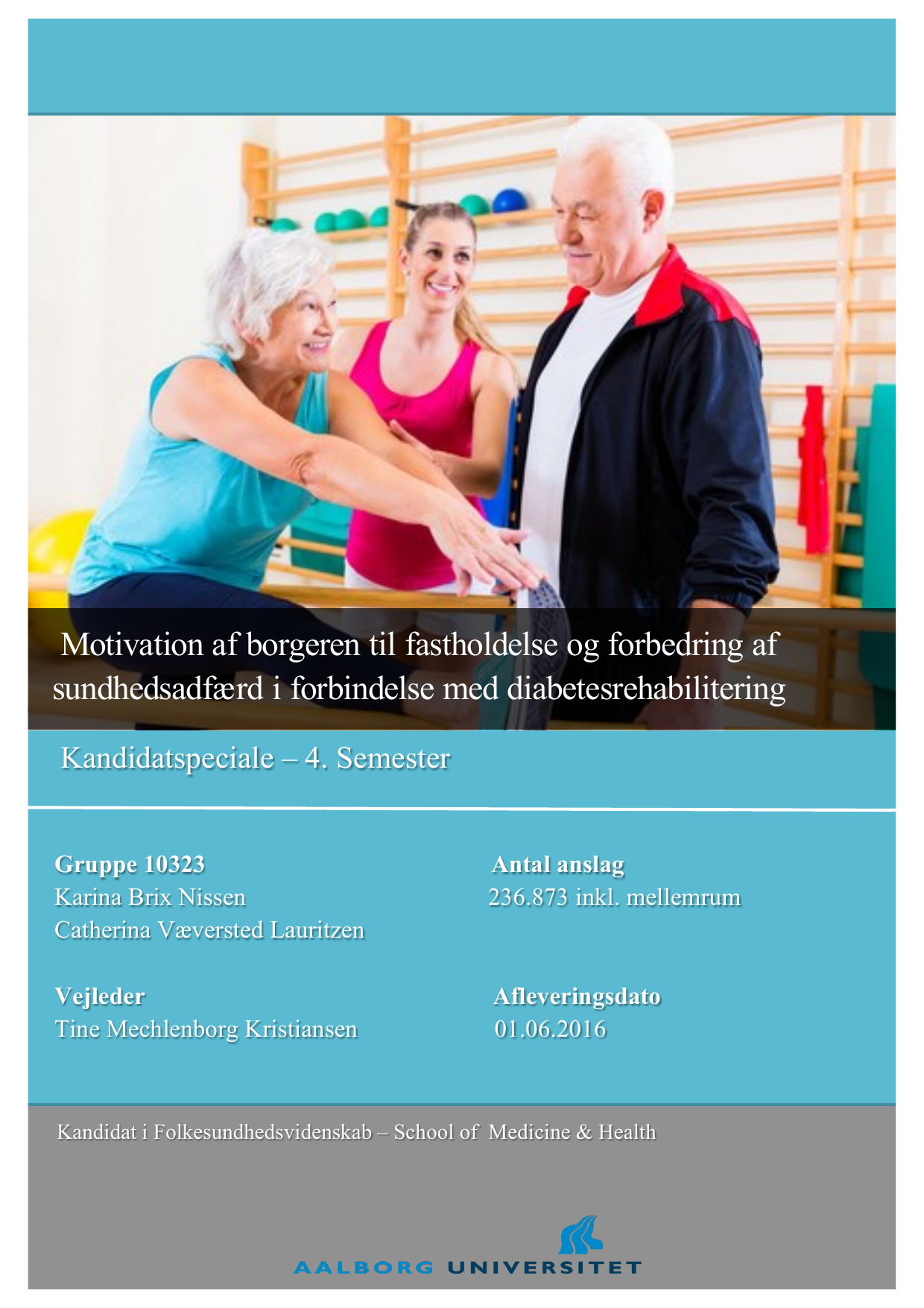
Motivation af borgeren til fastholdelse og forbedring af sundhedsadfærd i forbindelse med diabetesrehabilitering
Oversat titel
Motivation of the citizen to maintain and improve health behavior in diabetes rehabilitation
Forfattere
Semester
4. semester
Uddannelse
Udgivelsesår
2016
Afleveret
2016-05-27
Antal sider
246
Abstract
Baggrund: Prævalensen af diabetes type 2 (DM2) er stigende samt estimeres at stige hvilket forekommer problematisk samfundsøkonomisk men også for det enkelte menneske med DM2’s livskvalitet. I henhold til den kommunale forebyggelse af DM2, indbefatter denne diabetes type 2 rehabiliteringstilbud (DM2-rehabiliteringstilbud) hvor der tilstræbes ændring af sundhedsadfærd hos borgeren, hvorved relevansen af borgerens oplevelse tydeliggøres. Tilbud rettet mod DM2 bistår med varierende grader af opnået ændret sundhedsadfærd, hvortil det forekommer problematisk såfremt borgeren ikke er motiveret til fastholde og eventuelt forbedre den opnåede ændrede sundhedsadfærd af tilbuddet. Formål: At undersøge hvorledes borgeren med DM2 oplever egen opnået ændret sundhedsadfærd i forbindelse med deltagelsen i et DM2-rehabiliteringstilbud samt opfølgningerne heraf. Samt hvorledes der kan konstrueres et forandringstiltag til opfølgningerne, således borgeren motiveres til fastholdelse og eventuelt forbedring af sundhedsadfærd. Metode: Der blev taget afsæt i et kvalitativt teorifortolkende casestudie baseret på empiri indsamlet gennem en deltagende observation af en 12-måneders opfølgning, samt tre semistrukturerede individuelle interviews af deltagende borgere på DM2-rehabiliteringstilbuddet. Af teoretisk perspektiv blev der taget afsæt i en fænomenologisk-hermeneutisk tilgang. Analysen består af en meningsanalyse med teoretisk meningsfortolkning af empirien ved anvendelse af teorierne Self-determination theory (SDT) og Sense of Coherence (SOC), som på dansk betegnes oplevelse af sammenhæng(OAS) i bestræbelsen på at opnå forståelse af empirien. Resultater: Fire kategorier formede sig med relevans for borgerens oplevelse af opnået ændret sundhedsadfærd gennem tilbuddet og opfølgningerne samt, hvad der motiverer til fastholdelse og eventuelt forbedring heraf. Den første indebar “Oplevet ændret sundhedsadfærd gennem tilbuddet og opfølgningerne”. Den anden indebar “Fællesskabet deltagerne imellem”. Den tredje “Tydeliggørelse af risiko for sendiabetiske komplikationer” og den fjerde indebar “Opstilling og visualisering af mål for sundhed”. Konklusion: Borgerne oplevede varierende grader af OAS og opnået ændret sundhedsadfærd, i forbindelse med DM2-rehabiliteringstilbuddet. Dog oplevede ingen af borgerne at opfølgningerne bidrog til OAS og ændring af sundhedsadfærd. Et forandringstiltag til opfølgningerne kan bistå med borgerens OAS og motivation til fastholdelse og eventuelt forbedring sundhedsadfærd, gennem følgende dele: “Konstruktion af en Facebookgruppe”, “Etablering af træningsmakker” samt “Opstilling og visualisering af mål for sundhed”.
Background: The prevalence of type 2 diabetes (DM2) is increasing, and is estimated to continue to increase, which is problematic, both socio-economic, but also for the life quality of the individuals living with DM2. The municipal prevention of DM2 includes a type 2 diabetes rehabilitation program (DM2 rehabilitation program), that aims at changing the health behavior of the citizen with DM2, which highlights the importance of the citizen experience. DM2 programs shows varying degrees of achieved health behavior change. It is therefore problematic if the citizen is not motivated, and does not maintain, and possibly improve, the achieved health behaviors, which he has acquired through the rehabilitation program. Objective: To examine how the citizen with DM2 experience their own achieved health behaviors during the participation of a DM2 rehabilitation program and follow-ups. And how change management initiatives can be designed for the follow-ups, so the citizen is motivated to maintain, and possibly improve, health behaviors. Method: The method is based on a qualitative theory-interpretative case study, based on empirical data gathered through a participating observation of a 12 month follow-up, as well as three semi-structured individual interviews with citizens of the program. The theoretical perspective was based on a phenomenological-hermeneutic approach. The analysis seeking meaning consists of a theoretical interpretation of the empirical data, by using the Self-determination Theory (SDT) and Sense of Coherence (SOC) in an effort to gain understanding of the empirical data. Results: Four categories appeared with relevance to the citizen experience of the achieved health behavior change from the program and follow-ups, along with what motivates to maintain and potentially improve the health behavior. The first category contained “Experience of achieved health behavior change from the DM2 rehabilitation program and follow-ups”. The second category contained “The community among the participants”. The third category contained “Clarification of the risk of late diabetic complications”. The fourth category contained “Establishment and visualization of health related goals”. Conclusion: Citizens experienced varying degrees of SOC and achieved health behavior change during the DM2 rehabilitation program. However, none of the citizens experienced that the follow-ups contributed to SOC and health behavior change. Change management initiatives can assist with citizen’s experience of SOC and motivation for maintaining, and possibly improving, health behavior during the follow-ups, through the following points: “The establishment of a Facebook group”, “The establishment of a workout buddy” and “Establishment and visualization of health related goals”.
Emneord
